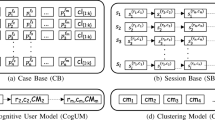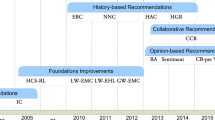Abstract
Critiques are employed as user feedback in critiquing-based recommender systems and they play an important role in the learning of user preferences, where recommender systems can gradually refine their understanding of user needs and provide better recommendations to users in subsequent interaction sessions. To reduce the effort of user interaction, the advantage of improving the recommendation efficiency by exploring relevant critiquing sessions in the interaction histories of other users has been recognized in recent studies of experience-based critiquing. In this study, we propose a novel approach for processing the historical interaction data in compound critiquing systems. In particular, we describe a history-aware collaborative compound critiquing method, which combines the strategies of preference-based compound critiquing generation and graph-based relevant session identification. Based on a simulation study using real-life data sets, we demonstrated that the proposed method outperformed other experience-based critiquing methods in terms of the recommendation efficiency. We also conducted a retrospective user evaluation, which confirmed the following observations: (1) incorporating user experience into compound critiquing systems significantly improves the performance compared with traditional unit critiquing systems; and (2) our graph-based session identification approach is superior to other baseline methods in terms of reducing the interaction effort of users.




















Similar content being viewed by others
Explore related subjects
Discover the latest articles and news from researchers in related subjects, suggested using machine learning.Notes
\(=,>,<\) are used for numerical attributes, and \(=,\ne\) are for categorical attributes.
Note that the three methods (HIGH, LOW, and RAND) have a tuned threshold (\(70\,\%\)) for the support value.
\(|I^{'}|\) and \(|I^{*}|\) are the numbers of items in \(s_{i}\) and \(s_{j}\), respectively (the finally accepted item is excluded).
\(OverlapScore(s_{i},s_{j}) = [\sum _{c^{'}\in s_{i}}\sum _{c^{*}\in s_{j}}match({c^{'},c^{*}})]^{2}\); if \(c^{'} = c^{*}\), \(match() = 1\); otherwise, \(match() = 0\).
\(Compatibility(i_{t},q)\) is the number of satisfied critiques in the current session q that are satisfied by the item \(i_{t}\) (i.e., \(Compatibility(i_{t},q) = |\{c_{i}|satisfies(i_{t},c_{i}),c_{i}\in q\}|).\)
\(Size_{base}\) was set as 836 and 4898 for the CAR and WINE data sets, respectively.
The p value was calculated using the Student’s t test.
\(Size_{base}=863\) for the LAPTOP data set, and 406 and 4898 for the CAR and WINE data sets, respectively.
References
Adomavicius G, Tuzhilin A (2005) Toward the next generation of recommender systems: a survey of the state-of-the-art and possible extensions. IEEE Trans Knowl Data Eng 17(6):734–749
Aggarwal CC (2016) Knowledge-based recommender systems. In: Recommender systems. Springer, Berlin, pp 167–197
Becerra C, Gonzalez F, Gelbukh A (2011) Visualizable and explicable recommendations obtained from price estimation functions. In: Proceedings of the human decision making in recommender systems, pp 27–34
Bunke H, Shearer K (1998) A graph distance metric based on the maximal common subgraph. Pattern Recognit Lett 19(3):255–259
Burke RD, Hammond KJ, Yound BC (1997) The findme approach to assisted browsing. IEEE Intell Syst 12(4):32–40
Carenini G, Poole D (2002) Constructed preferences and value-focused thinking: implications for ai research on preference elicitation. In: AAAI-02 workshop on preferences in AI and CP: symbolic approaches, pp 1–10
Chen L (2008) User decision improvement and trust building in product recommender systems. PhD thesis, Ecole Polytechnique Federale De Lausanne EPFL, Lausanne
Chen L, Pu P (2006) Evaluating critiquing-based recommender agents. In: Proceedings of the national conference on artificial intelligence, vol 21. AAAI Press, MIT Press, Menlo Park, pp 157
Chen L, Pu P (2007) Preference-based organization interfaces: aiding user critiques in recommender systems. In: User modeling 2007: 11th international conference, UM 2007, Corfu, Greece, July 25–29, 2007, proceedings, vol 4511. Springer, Berlin, pp 77–86
Chen L, Pu P (2009) Interaction design guidelines on critiquing-based recommender systems. User Model User-Adapt Interact 19(3):167–206
Chen L, Pu P (2012) Critiquing-based recommenders: survey and emerging trends. User Model User-Adapt Interact 22(1–2):125–150
Cortez P, Cerdeira A, Almeida F, Matos T, Reis J (2009) Modeling wine preferences by data mining from physicochemical properties. Dec Supp Syst 47(4):547–553
Felfernig A, Friedrich G, Jannach D, Zanker M (2015) Constraint-based recommender systems. In: Recommender systems handbook. Springer, Berlin, pp 161–190
Gu B, Sheng VS (2016) A robust regularization path algorithm for \(\nu\)-support vector classification. IEEE Trans Neural Netw Learn Syst
Gu B, Sheng VS, Wang Z, Ho D, Osman S, Li S (2015) Incremental learning for \(\nu\)-support vector regression. Neural Netw 67:140–150
He YL, Liu JNK, Hu YX, Wang XZ (2015) Owa operator based link prediction ensemble for social network. Exp Syst Appl 42(1):21–50
Keeney RL (1993) Decisions with multiple objectives: preferences and value trade-offs. Cambridge University Press, Cambridge
Li X, Xie H, Song Y, Zhu S, Li Q, Wang FL (2015) Does summarization help stock prediction? A news impact analysis. IEEE Intell Syst 30(3):26–34
Linden G, Hanks S, Lesh N (1997) Interactive assessment of user preference models: the automated travel assistant. In: Proceedings of the sixth international conference on user modeling, pp 67–68
Mandl M, Felfernig A (2012) Improving the performance of unit critiquing. In: Proceedings of the 20th conference on user modeling, adaptation, and personalization. Springer, Berlin, pp 176–187
Schraefel MC, Lloyd R (2010) User interaction in semantic web research. Web Seman Sci Serv Agents World Wide Web 8:375–376
McCarthy K, McGinty L, Smyth B (2005) Dynamic critiquing: an analysis of cognitive load. In: Proceedings of the 16th Irish conference on artificial intelligence and cognitive science, pp 19–28
McCarthy K, Reilly J, McGinty L, Smyth B (2004) On the dynamic generation of compound critiques in conversational recommender systems. In: Adaptive hypermedia and adaptive web-based systems. Springer, Berlin, pp 176–184
Mccarthy K, Reilly J, Smyth B, Mcginty L (2005) Generating diverse compound critiques. Artif Intell Rev 24(3–4):339–357
McCarthy K, Salem Y, Smyth B (2010) Experience-based critiquing: reusing critiquing experiences to improve conversational recommendation. In: Proceedings of 18th international conference on case-based reasoning. Springer, Berlin, pp 480–494
Mouli SC, Chakraborti S (2015) Making the most of preference feedback by modeling feature dependencies. In: Proceedings of the 9th ACM conference on recommender systems. ACM, New York, pp 285–288
Pan W (2016) A survey of transfer learning for collaborative recommendation with auxiliary data. Neurocomputing 177:447–453
Pan W, Liu Z, Ming Z, Zhong H, Wang X, Xu C (2015) Compressed knowledge transfer via factorization machine for heterogeneous collaborative recommendation. Knowl-Based Syst 85:234–244
Pan Z, Lei J, Zhang Y, Sun X, Kwong S (2016) Fast motion estimation based on content property for low-complexity h. 265/hevc encoder. IEEE Trans Broadcast 62(3):2016
Pan Z, Zhang Y, Kwong S (2015) Efficient motion and disparity estimation optimization for low complexity multiview video coding. IEEE Trans Broadcast 61(2):166–176
Payne JW, Bettman JR, Johnson EJ (1993) The adaptive decision maker. Cambridge University Press, Cambridge
Pu P, Faltings B (2000) Enriching buyers’ experiences: the smartclient approach. In: Proceedings of the SIGCHI conference on Human factors in computing systems. ACM, New York, pp 289–296
Quinlan JR (1993) Combining instance-based and model-based learning. In: Proceedings of the 10th international conference on machine learning, pp 236–243
Reilly J, McCarthy K, McGinty L, Smyth B (2004) Dynamic critiquing. In: European conference on case-based reasoning. Springer, Berlin, pp 763–777
Reilly J, McCarthy K, McGinty L, Smyth B (2005) Incremental critiquing. Knowl-Based Syst 18(4):143–151
Ruotsalo T, Haav K, Stoyanov A, Roche S, Fani E, Deliai R, Mäkelä E, Kauppinen T, Hyvönen E (2013) Smartmuseum: a mobile recommender system for the web of data. Web Seman Sci Serv Agents World Wide Web 20:50–67
Salem Y, Hong J (2013) History-aware critiquing-based conversational recommendation. In: Proceedings of the 22nd international conference on world wide web companion, pp 63–64
Salem Y, Hong J, Liu W (2015) Csfinder: a cold-start friend finder in large-scale social networks. In: 2015 IEEE international conference on big data. IEEE, New York, pp 687–696
Shearin S, Lieberman H (2001) Intelligent profiling by example. In: Proceedings of the 6th international conference on Intelligent user interfaces. ACM, New York, pp 145–151
Shimazu H (2001) Expertclerk: navigating shoppers’ buying process with the combination of asking and proposing. In: Proceedings of the 17th international joint conference on artificial intelligence, vol 2. Morgan Kaufmann Publishers Inc., USA, pp 1443–1448
Smyth B, McGinty L (2003) An analysis of feedback strategies in conversational recommender systems. In: Proceedings of the fourteenth national conference on artificial intelligence and cognitive science (AICS-2003), pp 211–216
Tinghuai M, Jinjuan Z, Meili T, Yuan T, Abdullah A-D, Mznah A-R, Sungyoung L (2015) Social network and tag sources based augmenting collaborative recommender system. IEICE Trans Inf Syst 98(4):902–910
Tversky A, Simonson I (1993) Context-dependent preferences. Manag Sci 39(10):1179–1189
Wen X, Shao L, Xue Y, Fang W (2015) A rapid learning algorithm for vehicle classification. Inf Sci 295:395–406
Xia Z, Wang X, Sun X, Liu Q, Xiong N (2016) Steganalysis of lsb matching using differences between nonadjacent pixels. Multimed Tools Appl 75(4):1947–1962
Xie H, Chen L, Wang F (2014) Collaborative compound critiquing. In: User modeling, adaptation, and personalization. Springer, Berlin, pp 254–265
Xie H, Li X, Wang T, Lau RYK, Wong T-L, Chen L, Wang FL, Li Q (2016) Incorporating sentiment into tag-based user profiles and resource profiles for personalized search in folksonomy. Inf Process Manag 52(1):61–72
Xie H, Zou D, Lau RYK, Wang FL, Wong T-L (2016) Generating incidental word-learning tasks via topic-based and load-based profiles. IEEE MultiMed 23(1):60–70
Zhang J, Pu P (2006) A comparative study of compound critique generation in conversational recommender systems. In: Proceeding of the 4th international conference on adaptive hypermedia and adaptive web-based systems. Springer, Berlin, pp 234–243
Zheng Y, Jeon B, Xu D, Wu QM, Zhang H (2015) Image segmentation by generalized hierarchical fuzzy c-means algorithm. J Intell Fuzzy Syst 28(2):961–973
Acknowledgments
The work described in this paper was fully supported by the Start-Up Research Grant (RG 37/2016-2017R) of The Education University of Hong Kong, a grant from the Research Grants Council of the Hong Kong Special Administrative Region, China (UGC/FDS11/E06/14), Hong Kong Research Grants Council under Project ECS/HKBU 211912, Internal Research Grant of the Hong Kong Institute of Education (RG 30/2014-2015), China National Natural Science Foundation under Project NSFC/61272365 and 61502545, Soft Science Research Project of Guangdong Province (2014A030304013), Special Program for Applied Research on Super Computation of the NSFC-Guangdong Joint Fund (the second phase), and the Fundamental Research Funds for the Central Universities under Project 46000-31610009. The preliminary version of this paper was published at UMAP 2014 [46].
Author information
Authors and Affiliations
Corresponding author
Rights and permissions
About this article
Cite this article
Xie, H., Wang, D.D., Rao, Y. et al. Incorporating user experience into critiquing-based recommender systems: a collaborative approach based on compound critiquing. Int. J. Mach. Learn. & Cyber. 9, 837–852 (2018). https://doi.org/10.1007/s13042-016-0611-2
Received:
Accepted:
Published:
Issue Date:
DOI: https://doi.org/10.1007/s13042-016-0611-2




